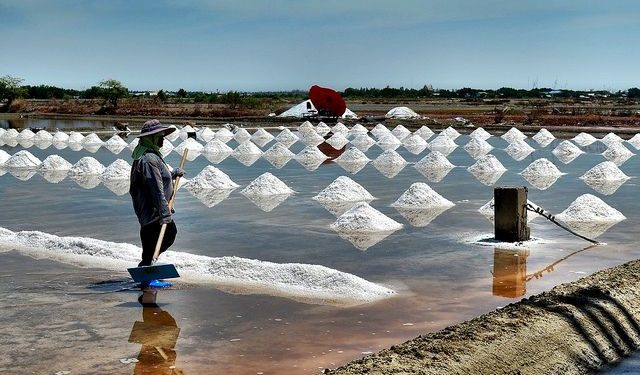Jakarta, Indonesia Sentinel — Indonesia’s Ministry of Marine Affairs and Fisheries (KKP) plans to transform Rote Ndao Regency in East Nusa Tenggara into a key hub for national industrial salt production as part of a broader effort to achieve salt self-sufficiency by the end of 2027.
“As a maritime nation, we need to be food self-sufficient, including salt. We can’t keep relying on imports,” said Marine Affairs and Fisheries Minister Sakti Wahyu Trenggono at the ministry’s headquarters on Thursday (May 22). “We will be working hard over the next three years to meet this goal.”
The initiative aligns with Presidential Regulation No. 17 of 2025, which mandates the acceleration of Indonesia’s national salt development program.
Trenggono pointed to the bay areas in Rote as having significant potential, noting that the region lies along the same geographical line as Australia that could produce 10 million tons of salt annually across 10,000 hectares of land.
Trenggono believes the location holds significant promise, with the potential to mirror Australia’s salt production levels. He noted that if Indonesia could match even half of Australia’s annual output with roughly 5 million tons, it would be sufficient to meet domestic demand.
“Our national requirement is about 5 million tons, covering household use, industrial applications, and chlor-alkali processes (CAP), which are essential for oil drilling and other sectors,” Trenggono said.
According to Koswara, Director General of Marine Management at the Ministry of Marine Affairs and Fisheries, despite Indonesia’s vast coastline, more than half of the salt used in the food and pharmaceutical industries is still imported.
“This shortfall exists because locally produced salt has not yet met the high-quality benchmarks required by industry,” Koswara said in an official statement on Monday (May 19).
To address this gap, Koswara emphasized that the ministry is accelerating efforts to boost national salt output and reduce reliance on imports while also to achieve salt self-sufficiency by 2027.
Central to that strategy is the planned development of an industrial salt production hub in Rote Ndao Regency, which is expected to help supply the country’s growing industrial demand.
Read Also:
Having Vast Untapped Energy, Prabowo Confidence Indonesia will Achieve Self-Sufficiency
Rote Ndao was selected due to its low rainfall and high salinity, two critical factors for effective salt farming. The Directorate General has identified more than 1,000 hectares of potential land in Rote Timur and Pantai Timur subdistricts.
The mapping phase includes technical and ecological feasibility studies, such as water source availability and social impact assessments, to ensure long-term sustainability.
“We’ve also received strong support from local authorities. The regent has expressed his commitment, and we hope implementation can begin in 2025,” Koswara added.
Rote Ndao Regent Paulus Henuk welcomed the initiative, expressing hope that the salt industry hub will generate jobs and boost regional income. “On behalf of the people of Rote Ndao, I want to thank the central government and KKP. This brings fresh hope for our community,” Paulus said.
(Raidi/Agung)


























